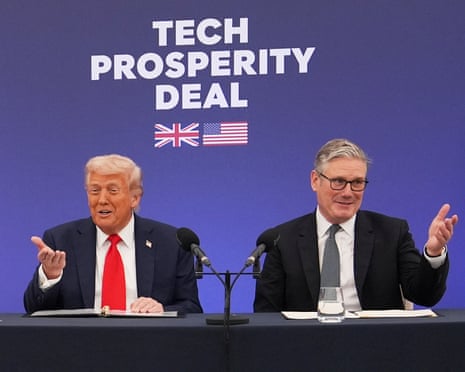Top Stories
UK Strikes £31 Billion Tech Deal with US Amid Key Concerns

The UK and the United States have entered into a significant partnership with a £31 billion tech agreement aimed at bolstering the UK’s artificial intelligence (AI) sector. Announced earlier this week, this bilateral deal is expected to facilitate substantial investment from major US technology firms, including Meta, Google, and Microsoft. While the agreement promises a boost for UK infrastructure, experts and local communities are questioning the implications of this arrangement.
Peter Kyle, the former UK technology secretary, highlighted the necessity for the UK to engage with these tech giants with “a sense of statecraft” and “humility.” This perspective reflects the ongoing need for careful negotiation, especially given the power these companies wield in the global tech landscape. The deal is positioned as an opportunity for the UK to enhance its AI capabilities, aiming to attract investment that could potentially transform its tech environment.
Concerns persist, however, about the nature of the investment and its benefits to local communities. The UK government’s rationale for this deal stems from the dominance of US companies in the global AI value chain. Despite the attractive headline figures, skepticism remains regarding the actual returns for citizens, particularly in areas like Blyth in Northumberland, where local communities may be asked to provide land and resources.
Historical context reveals potential pitfalls. In the US, similar developments have led to increased energy costs and limited job creation. For instance, a proposed “hyperscale” data center in Buckinghamshire has already faced local opposition due to concerns about its impact on the community. To avoid similar backlash, the UK government must ensure that investments generate tangible benefits for local economies rather than merely serving the profit motives of foreign firms.
The investment landscape raises questions about prioritizing US tech over domestic capabilities. Liz Kendall, who succeeded Kyle as technology secretary, described the partnership as a “vote of confidence in Britain’s booming AI sector.” However, many of the involved companies are not UK-based, prompting concerns about the sustainability and growth of homegrown tech enterprises.
While US investment is crucial for developing cutting-edge AI technologies, it is essential for the UK to foster its own tech ecosystem. Other regions, such as the EU’s EuroStack initiative and Brazil’s recent policies under President Luiz Inácio Lula da Silva, have demonstrated alternative strategies for enhancing local capabilities and promoting smaller enterprises.
The core issue remains the UK government’s vision for AI. Often, there is an implicit belief that advancements in AI will yield significant social benefits. Yet, claims about transformative potential, such as improving patient care, require scrutiny. Policymakers should focus on what AI can achieve for society and identify necessary technological investments accordingly.
Exploring alternative AI models could prove beneficial for the UK. The success of China’s DeepSeek illustrates the potential of a “fast follower” approach, allowing the UK to evaluate innovations and pursue cost-effective solutions on its own terms.
The UK government possesses the tools to support a diverse AI research environment. The sovereign AI unit could be instrumental in promoting alternative research methods, while resources like the new AI Research Resource and National Data Library could prioritize access for smaller organizations and public entities.
To prevent public funds from disproportionately benefiting large tech firms, the government might consider measures aimed at retaining talent and intellectual property within the UK. This could include robust regulatory frameworks to mitigate predatory practices from major corporations.
Collaboration with US tech companies remains vital. However, as history shows, well-intentioned partnerships can inadvertently lead to significant profits for large firms without equivalent benefits for the public good. For the UK to navigate this complex landscape successfully, it requires a clear strategy, careful planning, and the necessary diplomatic skills to advocate for national interests.
The path ahead is demanding but offers opportunities to reshape the UK’s technological future, ensuring that investments align with the needs of local communities and the broader public.
-

 World2 months ago
World2 months agoCoronation Street’s Shocking Murder Twist Reveals Family Secrets
-

 Entertainment2 months ago
Entertainment2 months agoAndrew Pierce Confirms Departure from ITV’s Good Morning Britain
-

 Health5 months ago
Health5 months agoKatie Price Faces New Health Concerns After Cancer Symptoms Resurface
-

 Health2 weeks ago
Health2 weeks agoSue Radford Reveals Weight Loss Journey, Shedding 12–13 kg
-

 Entertainment6 months ago
Entertainment6 months agoKate Garraway Sells £2 Million Home Amid Financial Struggles
-

 Entertainment5 months ago
Entertainment5 months agoAnn Ming Reflects on ITV’s ‘I Fought the Law’ Drama
-

 World3 months ago
World3 months agoBailey Announces Heartbreaking Split from Rebecca After Reunion
-

 Entertainment2 months ago
Entertainment2 months agoDavid Jason and Nicholas Lyndhurst Eye Reunion for Only Fools Anniversary
-

 Entertainment3 months ago
Entertainment3 months agoCoronation Street Fans React as Todd Faces Heartbreaking Choice
-

 World3 months ago
World3 months agoEastEnders’ Nicola Mitchell Faces Unexpected Pregnancy Crisis
-

 Entertainment2 months ago
Entertainment2 months agoBradley Walsh Sparks Strictly Come Dancing Hosting Speculation
-

 Entertainment2 months ago
Entertainment2 months agoTwo Stars Evicted from I’m A Celebrity Just Days Before Finale





















